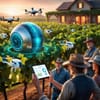Artificial intelligence (AI) is being increasingly adopted by wineries and vineyards to optimize operations, improve grape quality, and reduce waste. From predictive analytics to machine learning algorithms, AI is revolutionizing the wine industry.
Wineries are using AI-powered sensors to monitor temperature, humidity, and soil conditions in real-time, enabling them to make data-driven decisions about irrigation, pruning, and harvesting. AI algorithms can also analyze satellite images to detect early signs of disease or pests, allowing winemakers to take proactive measures.
Additionally, AI is being used to optimize winemaking processes, such as fermentation and blending. Machine learning algorithms can analyze vast amounts of data to identify patterns and predict outcomes, helping winemakers to refine their techniques and produce higher-quality wines.
The use of AI in vineyards is not only improving efficiency and productivity but also helping to reduce environmental impact. By optimizing irrigation and fertilizer use, wineries can minimize their water and chemical usage, resulting in more sustainable practices.
As the wine industry continues to evolve, it's likely that AI will play an increasingly important role in shaping the future of winemaking. With its ability to analyze complex data sets, predict outcomes, and optimize processes, AI is poised to revolutionize the way wine is produced, from vineyard to bottle.


